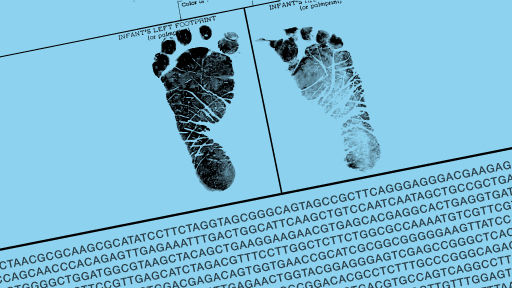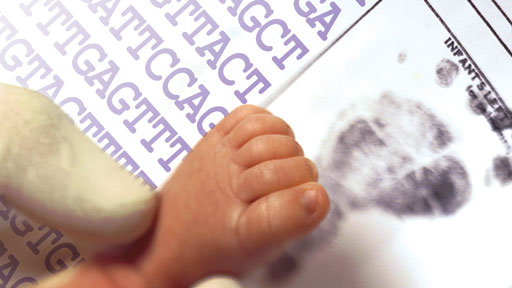In a new analysis, a working group of the Clinical Sequencing Exploratory Research (CSER) Consortium has offered an ethical framework to guide pediatricians in pursuing clinical sequencing studies, interpreting results, and, especially, disclosing findings. The study was posted online on Sept. 14, 2015, and will be published in the October 2015 issue of PEDIATRICS.
The CSER program, established in 2010 to speed the integration of genomics into clinical medicine, is funded by the National Human Genome Research Institute (NHGRI) and the National Cancer Institute (NCI), both part of the National Institutes of Health (NIH).

The working group concluded that pediatricians should consider "three core concepts of pediatric ethics" as guiding principles for using genome sequencing in clinical practice: the best interests of the child standard; surrogate decision-making by parents; and pediatric assent.
With the framework recommended by the working group, this may not be as hard as it sounds. Although genomic technologies may be new to many pediatricians, and may require them to seek expert help in interpreting and explaining results, the ethical issues involved in genomics are familiar, according to the study authors.
"The take-home message is that genome sequencing ethics is no different from the rest of pediatric ethics," said Laurence McCullough, Ph.D., associate director for education, Dalton Tomlin Chair in Medical Ethics and Health Policy at Baylor College of Medicine in Houston, and lead author of the working group's paper. "Genome sequencing can be fully integrated into standard pediatrics ethics and practice," he added.
Ethical issues in pediatrics are often more complex than in the medical treatment of adults, said Jean McEwen, J.D., Ph.D., program director for the Ethical, Legal and Social Implications (ELSI) Research Program in the NHGRI Division of Genomics and Society.
By definition, young children cannot give informed consent for any medical procedure; very young children simply don't know what is going on. Older children can voice pediatric assent, but this is non-binding. However, more and more weight should be given to children's assent as they mature - particularly the assent of older adolescents "who are capable of adult-like decision making," the study noted.
Parents, as surrogates, can give or withhold informed permission on their children's behalf. But the parents don't have the last word. If they refuse permission for a diagnostic test that the pediatrician believes is in the best interests of the child, the pediatrician can override them.
"It's a more complex analysis," said Dr. McEwen, "You've got surrogate decision-making on behalf of the child, but you also need to apply the best interests of the child standard. It's the classic issue of how much autonomy should parents have versus how much should that autonomy be constrained."
Applying the three core concepts, the working group reasoned its way through to a series of specific recommendations for pediatricians.
The working group concluded that pediatricians should explain to parents - and to children and adolescents old enough to understand the issues - the role of genome sequencing in diagnosis, risk assessment for health, reproductive risk assessment and pharmacogenomics. In particular, pediatricians should warn parents and patients that genome sequencing may reveal unexpected disease or genetic variants whose effect is unknown.
Because of their obligation to protect the best interests of the child, pediatricians must recommend genomic sequencing when necessary for diagnosis whether or not a child's parents agree, the study authors wrote. They should tell parents and appropriately mature patients about any gene variants related to the patient's disorder - even when the potential significance of the particular gene variant is unknown. They also must disclose the discovery of unexpected, secondary gene-linked conditions for which treatment exists, the authors concluded. The study calls this "a prima facie ethical obligation" of pediatricians.
Other genome sequencing results that pediatricians are ethically obligated to disclose, regardless of parents' views, include the following:
- Diagnoses. Even if no treatment exists, identifying a patient's condition is "an especially important consideration in cases of a "diagnostic odyssey."
- Risk assessment. Pediatricians should disclose risks for both early and late-onset conditions if childhood treatments exist to modify or prevent disease from developing. However, if effective treatments for late-onset conditions can begin in adulthood, parents and mature adolescents can make the decisions.
- Pharmacogenomics. Pediatricians must disclose the presence of genomic variants that can immediately help guide treatments.
- Life-threatening conditions, whether related to the original condition or discovered as an incidental result.
The study noted that some pediatricians may feel unable to deal with genetic and genomic issues because of inadequate training. In these cases, it said, pediatricians must refer the patient and parents to a professional colleague. For most pediatricians, McCullough said, the challenges of genomic sequencing "have to do with the complexity and scope of the [genetic] information, not with ethics."
Co-authors of the PEDIATRICSstudy, in addition to Dr. McCullough, were: Kyle Brothers, M.D., of the University of Louisville in Louisville, Kentucky; Wendy Chung, M.D., Ph.D., of Columbia University in New York City; Stephen Joffe, M.D., of the University of Pennsylvania Pereleman School of Medicine in Philadelphia; Barbara Koenig, Ph.D., of the University of California at San Francisco; Benjamin Wilfond, M.D., of the University of Washington in Seattle; and Joon-Ho Yu, M.P.H., Ph.D., also of the University of Washington in Seattle.
Read the study
Laurence B. McCullough, Kyle B. Brothers, Wendy K. Chung, Steven Joffe, Barbara A. Koenig, Benjamin Wilfond, Joon-Ho Yu and on behalf of the Clinical Sequencing Exploratory Research (CSER) Consortium Pediatrics Working Group. Professionally Responsible Disclosure of Genomic Sequencing Results in Pediatric Practice. Pediatrics, published online September 14, 2015. [Abstract]
NHGRI is one of the 27 institutes and centers at the National Institutes of Health (NIH), an agency of the Department of Health and Human Services. The NHGRI Extramural Research Program supports grants for research and training and career development at sites nationwide. Additional information about NHGRI can be found at its website, www.genome.gov.
NCI leads the National Cancer Program and the NIH's efforts to reduce the prevalence of cancer and improve the lives of cancer patients and their families through research into prevention and cancer biology, the development of new interventions, and the training and mentoring of new researchers. For more information about cancer, please visit the NCI website at www.cancer.gov, or call NCI's Cancer Information Service at 1-800-4-CANCER.
NIH, the nation's medical research agency, includes 27 institutes and centers and is a component of the Department of Health and Human Services. NIH is the primary federal agency conducting and supporting basic, clinical, and translational medical research, and is investigating the causes, treatments, and cures for both common and rare diseases. For more information about NIH and its programs, visit www.nih.gov.




